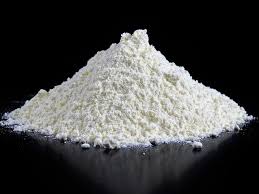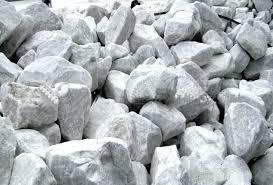![]()
If you’ve landed on this article page, you’re probably searching for a
good business idea—an idea that’s light on the pocket but heavy on
returns, promising both a fulfilling journey and potential profit.
|
How To Start A Calcium Carbonate Production Business in Nigeria
Calcium Carbonate is a versatile mineral compound widely used in
various industries such as construction, pharmaceuticals,
agriculture, and more. The production and supply of Calcium
Carbonate in Nigeria
offer significant opportunities for business growth and
economic development.
The Calcium Carbonate Production and Supply Business involves
the extraction, processing, and distribution of calcium
carbonate, a versatile mineral used in various industries. The
process begins with the research and identification of suitable
sources for calcium carbonate, such as limestone or marble
deposits. Once the raw materials are obtained, they undergo
crushing, grinding, and purification to achieve the desired
particle size and purity.
Nigeria has the opportunity to export calcium carbonate products
to other African countries, as well as international markets.
With proper marketing strategies and quality assurance, Nigerian
businesses can tap into the export potential of calcium
carbonate and establish themselves as reliable suppliers in the
global market.
The production yield of calcium carbonate in a Calcium Carbonate
Production and Supply Business can vary depending on the
efficiency of the processes and the quality of the raw materials
used. Typically, the production yield of calcium carbonate
ranges from 70% to 90%.
This means that for every 100 units of raw materials processed,
the business can expect to obtain approximately 70 to 90 units
of calcium carbonate. The yield can be influenced by factors
such as the quality and composition of the raw materials, the
effectiveness of the grinding and purification processes, and
the overall efficiency of the production operations.
1. Construction Industry: Calcium carbonate is widely used in
the construction industry for the production of cement,
concrete, and mortar, providing strength and durability to
structures.
2. Agriculture and Soil Amendment: Calcium carbonate is used as
a soil amendment to neutralize acidic soils and provide
essential calcium for plant growth, improving soil fertility and
crop yield.
3. Pharmaceutical and Healthcare: Calcium carbonate is used in
the pharmaceutical industry as an active ingredient in antacids
and calcium supplements for the treatment of calcium
deficiencies and as an excipient in tablet formulations.
4. Paper and Pulp Industry: Calcium carbonate is used as a
filler and coating pigment in the paper industry to enhance
paper whiteness, opacity, and printability.
5. Plastics and Rubber Industry: Calcium carbonate is used as a
filler and reinforcing agent in plastics and rubber products,
improving their mechanical properties and reducing costs.
6. Paints and Coatings: Calcium carbonate is used as a pigment
and filler in the production of paints, coatings, and inks,
providing opacity, brightness, and viscosity control.
7. Adhesives and Sealants: Calcium carbonate is used as a filler
and thickening agent in adhesives and sealants, improving their
bonding properties and consistency.
8. Environmental Applications: Calcium carbonate is used in
wastewater treatment processes for pH adjustment and removal of
heavy metals.
9. Food and Beverage Industry: Calcium carbonate is used as a
dietary supplement and food additive for calcium fortification
and as an anti-caking agent.
10. Animal Feed Industry: Calcium carbonate is used as a feed
additive to provide essential calcium and promote bone
development in animals.
1. Contribution to GDP Growth: Calcium carbonate production and
supply business in Nigeria can contribute to the economic growth
of the region by generating revenue and increasing the GDP.
2. Employment Opportunities: The industry provides job
opportunities, both directly and indirectly, through various
stages of production, including mining, processing, packaging,
and distribution.
3. Export Potential: Calcium carbonate production in Nigeria and
Africa presents an opportunity for export to other countries,
contributing to foreign exchange earnings and trade balance.
4. Local Raw Material Utilization: The production of calcium
carbonate utilizes local limestone deposits, promoting the
utilization of local resources and reducing the reliance on
imported raw materials.
5. Value Addition: The business adds value to raw materials by
processing calcium carbonate into various forms, such as
powders, granules, and slurries, which can be used in multiple
industries.
6. Cost Savings for Industries: Calcium carbonate, as a
cost-effective filler and pigment, can help reduce production
costs for industries such as paper, plastics, paints, and
coatings.
7. Infrastructure Development: The establishment of calcium
carbonate production facilities requires infrastructure
development, such as processing plants and transportation
networks, contributing to overall infrastructure growth.
8. Technology Transfer and Innovation: The production and supply
business can drive technology transfer and innovation through
the adoption of advanced processing methods and equipment.
9. Diversification of Industrial Sector: Calcium carbonate
production adds to the diversification of the industrial sector,
reducing dependence on traditional industries and promoting a
more balanced economy.
10. Local Value Chain Development: The business fosters the
development of a local value chain, involving suppliers of raw
materials, equipment manufacturers, and other supporting
industries.
11. Tax Revenues: Calcium carbonate production and supply
business generates tax revenues for the government, which can be
used for public services and infrastructure development.
12. Small and Medium Enterprises (SME) Support: The industry
provides opportunities for small and medium enterprises to
participate in the value chain, promoting entrepreneurship and
economic inclusivity.
13. Trade Development: Calcium carbonate production and supply
business can stimulate trade within Nigeria, Africa, and beyond,
fostering economic integration and regional cooperation.
14. Foreign Direct Investment (FDI): The sector can attract
foreign direct investment, leading to technology transfer, job
creation, and overall economic development.
15. Industrial Clustering: The establishment of calcium
carbonate production clusters can promote industrial synergy,
collaboration, and knowledge sharing, enhancing overall
productivity and competitiveness.
1. Construction Industry: Calcium carbonate is widely used as a
raw material in the construction industry for the production of
cement, concrete, and mortar.
2. Manufacturing of Plastics and Rubber Products: Calcium
carbonate is utilized as a filler and reinforcing agent in the
manufacturing of plastic and rubber products, such as pipes,
cables, automotive parts, and footwear.
3. Paper Industry: Calcium carbonate is a key component in the
production of paper, where it is used as a filler and coating
material, improving the paper’s smoothness, brightness, and
printability.
4. Paints and Coatings: Calcium carbonate is employed as a
pigment extender and filler in the manufacturing of paints,
coatings, and inks, enhancing their properties and providing
opacity and whiteness.
8. Animal Feed and Agriculture: Calcium carbonate is
incorporated into animal feed and agricultural products to
provide essential calcium and as a soil conditioner to improve
pH levels and enhance crop growth.
9. Water Treatment: Calcium carbonate is employed in water
treatment processes to adjust pH levels, remove impurities, and
reduce water hardness.
10. Environmental Remediation: Calcium carbonate can be used in
environmental remediation projects to neutralize acidic soils
and treat contaminated water and wastewater.
11. Ceramic and Glass Industry: Calcium carbonate is utilized as
a raw material in the production of ceramics, glass, and glazes,
imparting strength, opacity, and chemical resistance.
12. Adhesives and Sealants: Calcium carbonate is used as a
filler and thickening agent in the manufacturing of adhesives
and sealants, providing improved bonding and viscosity.
13. Construction Chemicals: Calcium carbonate is employed in the
production of construction chemicals, such as waterproofing
agents, tile adhesives, and grouts.
14. Rubber Compounding: Calcium carbonate is utilized in rubber
compounding processes to enhance the mechanical properties and
processing characteristics of rubber products.
15. Oil and Gas Industry: Calcium carbonate is used in the oil
and gas industry as a drilling fluid additive and weighting
agent for controlling well pressure and improving drilling
efficiency.
Facts About The Calcium Carbonate Production And Supply Business
In Nigeria
1. Abundant Raw Material: Nigeria and Africa possess vast
limestone reserves, a primary source of calcium carbonate,
making it favorable for production and supply businesses.
2. Growing Construction Industry: The expanding construction
sector in Nigeria and Africa drives the demand for calcium
carbonate as a key ingredient in cement and concrete production.
3. High Demand for Paper Products: The paper industry in Nigeria
and Africa relies on calcium carbonate as a filler and coating
material, benefiting the calcium carbonate production and supply
business.
4. Increasing Plastic Manufacturing: The growing plastic
manufacturing sector in Nigeria and Africa creates opportunities
for calcium carbonate usage as a filler and reinforcement agent.
5. Flourishing Paint and Coating Industry: The paint and coating
industry’s growth in Nigeria and Africa drives the demand for
calcium carbonate as a pigment extender and enhancing agent.
6. Thriving Food and Beverage Sector: The food and beverage
industry’s expansion in Nigeria and Africa requires calcium
carbonate for fortification, pH adjustment, and anti-caking
properties.
7. Rising Pharmaceuticals Market: The pharmaceutical sector’s
growth in Nigeria and Africa presents opportunities for calcium
carbonate usage in various formulations.
8. Agriculture and Animal Feed Industry: Calcium carbonate is
essential in agriculture for soil conditioning and as a calcium
source in animal feed, aligning with the agricultural sector’s
development
9. Water Treatment Demand: The need for water treatment
solutions in Nigeria and Africa creates a market for calcium
carbonate as a pH adjuster and water softener.
10. Growing Cosmetics Industry: The cosmetics industry’s
expansion in Nigeria and Africa creates demand for calcium
carbonate in toothpaste, skincare products, and cosmetics.
11. Increasing Ceramic Production: The ceramic industry’s growth
in Nigeria and Africa fuels the demand for calcium carbonate as
a raw material in the production of ceramics and glazes.
12. Diverse Industrial Applications: Calcium carbonate finds
applications in diverse industries such as adhesives, sealants,
rubber compounding, construction chemicals, and oil and gas.
13. Favorable Government Policies: Supportive government
policies and initiatives in Nigeria and Africa promote
industrial growth and provide opportunities for calcium
carbonate businesses.
14. Access to Domestic and Regional Markets: Nigeria’s strategic
location and trade agreements within Africa provide access to
domestic and regional markets for calcium carbonate products.
15. Technological Advancements: Technological advancements in
production processes and equipment enhance efficiency and
productivity in calcium carbonate production and supply.
16. Growing Environmental Concerns: The increasing focus on
sustainability and eco-friendly solutions creates opportunities
for calcium carbonate as a green alternative.
17. Strong Infrastructure Development: Infrastructure
development projects in Nigeria and Africa drive the demand for
calcium carbonate in construction materials.
18. Export Potential: The calcium carbonate production and
supply business in Nigeria has export potential to neighboring
African countries and beyond.
19. Employment Generation: The calcium carbonate industry
contributes to job creation, supporting local economies and
livelihoods.
20. Collaboration Opportunities: Collaboration with other
industries and sectors, such as plastics, construction, and
agriculture, opens avenues for calcium carbonate business
expansion.
21. Technological Collaboration: Collaborating with technology
providers for innovative production processes and product
development enhances competitiveness in the calcium carbonate
market.
22. Quality Assurance and Certification: Ensuring quality
standards and obtaining certifications enhances the credibility
and marketability of calcium carbonate products.
23. Research and Development: Investment in research and
development enables product innovation and diversification,
meeting evolving customer needs.
24. Supply Chain Optimization: Efficient supply chain management
and logistics play a crucial role in ensuring a smooth flow of
calcium carbonate products to customers.
25. Market Expansion Opportunities: As demand for calcium
carbonate grows, there are opportunities to expand into new
geographical markets within Nigeria and Africa.
1. Mining and Quarrying Operations: Companies involved in mining
and quarrying activities extract raw limestone or marble
deposits, the primary sources of calcium carbonate, and supply
them to other businesses for further processing.
2. Manufacturing and Processing Plants: Manufacturing and
processing plants specialize in transforming raw calcium
carbonate into various forms and grades suitable for specific
industries. They produce precipitated calcium carbonate (PCC),
ground calcium carbonate (GCC), or coated calcium carbonate
(CCC) based on customer requirements.
3. Precipitated Calcium Carbonate (PCC) Production: PCC
production plants utilize chemical processes to produce
high-purity calcium carbonate with controlled particle sizes and
specific properties. PCC is widely used in industries such as
paper, paints, plastics, and pharmaceuticals.
4. Ground Calcium Carbonate (GCC) Production: GCC production
plants focus on grinding and milling processes to produce fine
and ultrafine calcium carbonate powders. GCC finds applications
in industries such as plastics, paints, adhesives, and rubber.
5. Coated Calcium Carbonate (CCC) Production: CCC production
involves coating calcium carbonate particles with various
surface treatments to enhance their properties and improve
performance in specific applications. Coated calcium carbonate
is commonly used in the paper, paints, and plastics industries.
6. Calcium Carbonate Masterbatch Production: Masterbatch
producers incorporate calcium carbonate into plastic
masterbatches, which are widely used as additives in the plastic
manufacturing industry. These masterbatches provide enhanced
strength, color, and other properties to plastic products.
7. Calcium Carbonate Filler Production: Companies specialize in
producing calcium carbonate fillers that are added to various
materials, including plastics, paints, rubber, and adhesives, to
improve their physical properties and reduce costs.
8. Calcium Carbonate Micronization Services: Micronization
facilities focus on grinding and micronizing calcium carbonate
particles to achieve precise particle sizes and distributions
suitable for specific applications, such as pharmaceuticals,
cosmetics, and food additives.
9. Custom Calcium Carbonate Blending: Custom blending companies
provide tailored calcium carbonate blends by combining different
grades and types of calcium carbonate to meet specific customer
requirements in various industries.
10. Calcium Carbonate Exporters: Export-oriented businesses
specialize in sourcing, processing, and supplying calcium
carbonate products to international markets, capitalizing on the
global demand for calcium carbonate.
How To Start The Calcium Carbonate Production And Supply
Business In Nigeria and Africa: Step-By-Step Guide
Step 1: Market Research and Feasibility Study: Conduct a
comprehensive market research and feasibility study to assess
the demand for calcium carbonate in Nigeria and Africa, identify
target industries and customers, analyze competitors, and
evaluate the profitability and viability of the business.
Step 2: Business Plan Development: Create a detailed business
plan that outlines your business objectives, target market,
marketing strategies, production process, supply chain
management, financial projections, and legal and regulatory
requirements.
Step 3: Obtain Necessary Licenses and Permits: Obtain the
required licenses and permits to operate a calcium carbonate
production and supply business in Nigeria and comply with all
legal and regulatory requirements related to business
registration, environmental permits, and quality certifications.
Step 4: Secure Funding: Determine the financial requirements of
your business and secure adequate funding through
self-financing, bank loans, government grants, or investment
from partners or investors.
Step 5: Set Up Production Facility: Acquire or lease a suitable
production facility equipped with necessary machinery and
equipment for calcium carbonate production. Install the required
infrastructure for raw material storage, processing, quality
control, and packaging.
Step 6: Source Raw Materials: Identify reliable sources for the
raw materials required for calcium carbonate production, such as
limestone or marble. Establish procurement contracts with
suppliers to ensure a steady supply of quality raw materials.
Step 7: Establish Production Process: Develop a standardized
production process for calcium carbonate production, including
crushing, grinding, purification, and drying. Implement strict
quality control measures to ensure the desired product
specifications are met.
Step 8: Packaging and Distribution: Determine appropriate
packaging options for your calcium carbonate products,
considering industry requirements and customer preferences.
Establish efficient distribution channels to deliver products to
customers in Nigeria and Africa.
Step 9: Marketing and Sales: Develop effective marketing
strategies to promote your calcium carbonate products. Build
strong relationships with customers and industry stakeholders
through targeted marketing campaigns, participation in trade
shows, and online platforms.
Step 10: Quality Assurance and Compliance: Implement quality
assurance measures to maintain consistent product quality and
comply with relevant quality standards and regulations.
Regularly test and monitor product quality to meet customer
expectations.
Step 11: Customer Service and Support: Provide excellent
customer service by addressing customer inquiries, resolving
complaints, and offering technical support. Build long-term
relationships with customers to foster loyalty and repeat
business.
Step 12: Continuous Improvement: Continuously evaluate and
improve your production processes, product offerings, and
customer service based on market feedback and changing industry
trends. Stay updated with technological advancements to enhance
efficiency and competitiveness.
Get our training guide on how to start a lucrative Calcium
Carbonate Production Business. The information helps you market
and place the product correctly by identifying the target
customer group of the product ,it also helps you understand the
viability of the project by disclosing details like raw
materials required, manufacturing process, project costs and
snapshot of other project financials• The report provides
forecasts of key parameters which helps to anticipate the
industry performance and make sound business decision
|







